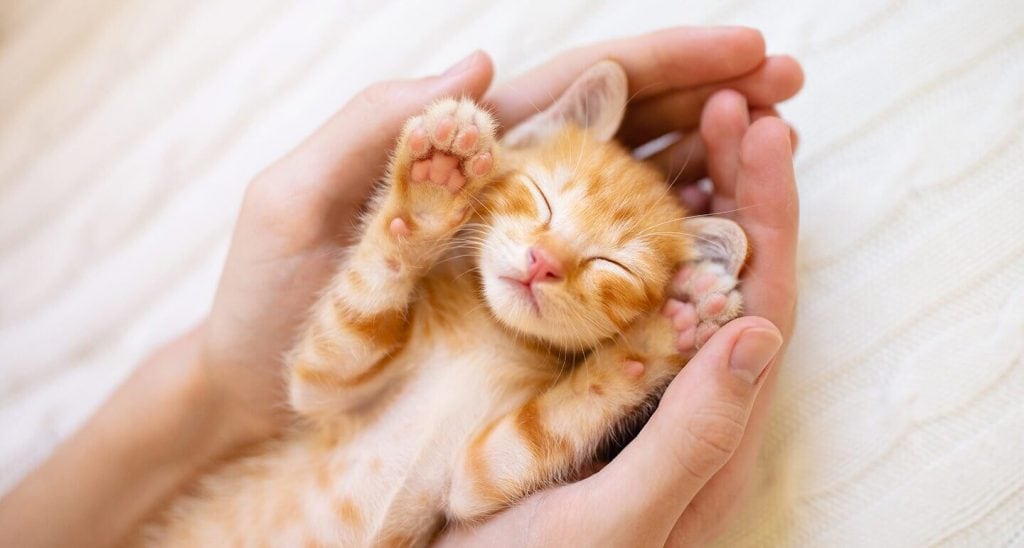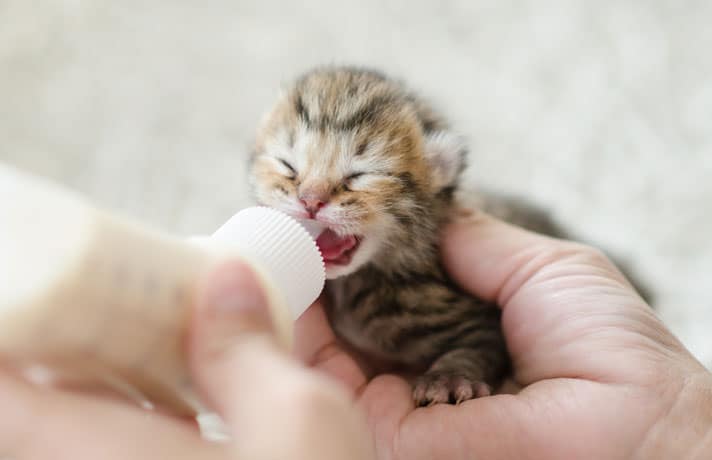When Veronika Guttenberger volunteered to foster two orphaned kittens, she knew caring for them would be a big commitment.
“It really was like caring for an infant,” she says, adding that both foster kittens needed to be bottle fed every two hours. “I had to get up in the middle of the night to feed them.”
But she also knew the joy of helping baby cats would be well worth the hard work. “It’s rewarding,” she says. “You’re helping them become healthy so they can be adopted into their forever homes.”
If you share Veronica’s dedication to caring for cats, fostering kittens just might be your calling—but it’s not a decision to take lightly. Read on to learn everything you need to know about caring for foster kittens.
What Is Kitten Fostering?
Animal shelter and rescue staff might not always be available to, say, bottle-feed baby cats at 3 a.m. That’s where foster kitten volunteers come in. Essentially, kitten fostering is when kittens from local shelters are placed into temporary homes where they will be safe and cared for until they are ready to be adopted, says Randa Richter, media and partnership relations at SPCA Florida Adoption Center in Lakeland, Florida. This helps shelters provide the best care to kittens, who need lots of attention in their first few months.
Foster kittens can range in age from neonatal to a few months old. The size of the litter varies as well. Sometimes a volunteer is asked to foster just two kittens, and other times it’s a whole litter along with the mother cat. Naturally, the level of care required also changes from litter to litter. “Some kittens in need of fostering are malnourished and underweight or require medication,” Richter says. “Fostering is especially important for kittens that need around-the-clock care.”
While it is preferable for foster caregivers to have some experience with animals, it isn’t a requirement, Richter says. If you’re interested in kitten fostering, Richter recommends reaching out to local animal shelters, rescues or welfare agencies to see if they have foster programs and take the next steps to get involved. At SPCA Florida, for instance, prospective foster caregivers fill out an application on their website. Afterward, a foster coordinator contacts them to get a better idea of what level of care they’re comfortable with, Richter says. Then, when the need arises, they can match the foster caregiver with kittens based on their care needs.
Foster Kitten Supplies
- A cozy bed
- A heating pad, especially if the kittens are orphans and don’t have a mama to keep them warm
- A carrier for transportation and vet visits
- Kitten milk replacer, soft kitten food, or kibble depending on the kitten’s age (Get a complete guide to feeding kittens here)
- A nursing bottle, if needed
- Food and water bowls
- A litter box
- Litter
- Kitten toys
- A cute cat-themed mug filled to the brim with coffee to keep you going (OK, this one is more of a suggestion.)
Be sure to ask your shelter or rescue which supplies they will provide and which you are responsible for obtaining.
Caring for Foster Kittens
While the level of care will depend on your foster kittens’ age and health, all kittens require proper nutrition, regular veterinary visits, socialization and of course, lots of love, Richter says.
Many shelters and rescues will check on foster kittens regularly to ensure all their needs are being met. For example, SPCA Florida has a veterinarian on staff who their foster caregivers typically see weekly to ensure the kittens are gaining weight and growing, Richter says, and the cost is completely covered. Prospective foster parents should ask how often they’ll need to check in and about any related expenses.
Foster kitten caregivers will also need support, as they’re sure to have questions. SPCA Florida, for example, provides an emergency foster phone line 24 hours a day and an active Facebook community where foster caregivers can seek advice from other, more experienced foster caregivers. Many other shelters and rescues offer similar services, and advocates like Hannah Shaw, aka the Kitten Lady, provide tips and advice online.
One of the most frequently asked questions Richter says she gets from first-time foster pet parents is how long they will have their foster kittens. Basically, kittens will stay with their foster caregivers until they’re healthy and weigh 2 pounds, she says. Kittens usually gain about a pound a month, but she notes that it can vary.
Other common questions pertain to bottle feeding and weaning kittens, litter box training and common health issues, she adds.
Dr. Robyn Barton, DVM, adoption center veterinarian at the SPCA Florida, says upper respiratory infections and parasites are the most common medical conditions to expect. Kitten foster parents should reach out to their shelter veterinarian if they notice sneezing, eye discharge, congestion or worms in the stool. If a kitten has diarrhea or isn’t eating or drinking, caregivers should see their shelter veterinarian immediately, she says.
“Kittens are extremely susceptible to dehydration because they’re so tiny,” she says. “They can be normal one day and within 24 hours, take a turn for the worse.”
Finding a Fur-ever Home for Your Kittens
Guttenberger ultimately adopted one of her foster kittens, a “foster fail” that Richter says isn’t uncommon. But while it is definitely a happy ending, she adds, it shouldn’t become a habit.
“Giving up your foster kittens to adoption is bittersweet,” she says. “I foster a lot of kittens and if I adopted them all, I wouldn’t have enough space in my home to foster the next baby that needs my help.”
At SPCA Florida, adoptions take place through their foster coordinators, not the foster caregivers themselves, but caregivers have plenty of ways to help get the word out. Some take charming photos and videos of their kittens to share on social media. Others recruit family, friends, co-workers and neighbors to spread the word. One volunteer even rented an RV and drove her foster kittens to their new homes in Illinois and South Carolina, says Megan Allan, foster care manager at SPCA Florida.
“Foster caregivers are really dedicated animal people,” she says. “They want to find the perfect match for their baby.”
Share:















